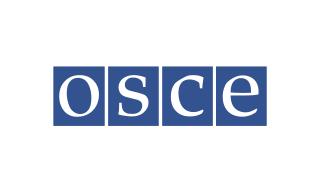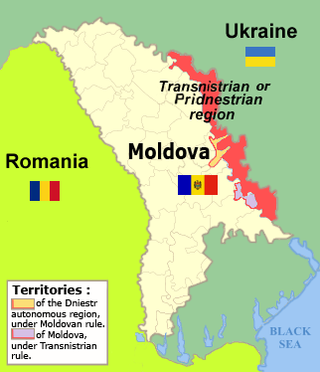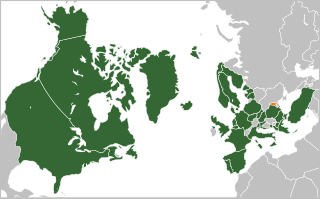
The Organization for Security and Co-operation in Europe (OSCE) is a regional security-oriented intergovernmental organization comprising member states in Europe, North America, and Asia. Its mandate includes issues such as arms control, the promotion of human rights, freedom of the press, and free and fair elections. It employs around 3,460 people, mostly in its field operations but also in its secretariat in Vienna, Austria, and its institutions. It has observer status at the United Nations.

The Commonwealth of Independent States (CIS) is a regional intergovernmental organization in Eurasia. It was formed following the dissolution of the Soviet Union in 1991, and is its legal successor. It covers an area of 20,368,759 km2 (7,864,422 sq mi) and has an estimated population of 239,796,010. The CIS encourages cooperation in economic, political, and military affairs and has certain powers relating to the coordination of trade, finance, lawmaking, and security, including cross-border crime prevention.

Transnistria, officially known as the Pridnestrovian Moldavian Republic and locally as Pridnestrovie, is a breakaway state internationally recognized as part of Moldova. It controls most of the narrow strip of land between the Dniester river and the Moldova–Ukraine border, as well as some land on the other side of the river's bank. Its capital and largest city is Tiraspol. Transnistria is officially designated by the Republic of Moldova as the Administrative-Territorial Units of the Left Bank of the Dniester or as Stînga Nistrului.

The GUAM Organization for Democracy and Economic Development is a regional organization of four post-Soviet states: Georgia, Ukraine, Azerbaijan, and Moldova.

Gudauta is a town in Abkhazia, Georgia, and a centre of the eponymous district. It is situated on the Black Sea, 37 km northwest of Sukhumi, the capital of Abkhazia. It is the namesake for the Gudauta Bay.
The original Treaty on Conventional Armed Forces in Europe (CFE) was negotiated and concluded during the last years of the Cold War and established comprehensive limits on key categories of conventional military equipment in Europe and mandated the destruction of excess weaponry. The treaty proposed equal limits for the two "groups of states-parties", the North Atlantic Treaty Organization (NATO) and the Warsaw Pact. In 2007, Russia "suspended" its participation in the treaty, and on 10 March 2015, citing NATO's alleged de facto breach of the Treaty, Russia formally announced it was "completely" halting its participation in it as of the next day. On 7 November 2023, Russia withdrew from the treaty, and in response the United States and its NATO allies suspended their participation in the treaty.

The Collective Security Treaty Organization (CSTO) is an intergovernmental military alliance in Eurasia consisting of six post-Soviet states: Armenia, Belarus, Kazakhstan, Kyrgyzstan, Russia, and Tajikistan, formed in 2002. The Collective Security Treaty has its origins in the Soviet Armed Forces, which was replaced in 1992 by the United Armed Forces of the Commonwealth of Independent States, and was then itself replaced by the successor armed forces of the respective independent states.
The Adapted Conventional Armed Forces in Europe Treaty is a post–Cold War adaptation of the Treaty on Conventional Armed Forces in Europe (CFE), signed on November 19, 1999, during the Organization for Security and Co-operation in Europe's (OSCE) 1999 Istanbul summit. The main difference with the earlier treaty is that the troop ceilings on a bloc-to-bloc basis would be replaced with a system of national and territorial ceilings. Furthermore, the adapted treaty would provide for more inspections and new mechanisms designed to reinforce States Parties’ ability to grant or withhold consent for the stationing of foreign forces on their territory.

The Russian Federation maintains an unknown number of soldiers in Transnistria, an unrecognized breakaway state internationally recognized as part of Moldova. This Russian military presence dates back to 1992, when the 14th Guards Army intervened in the Transnistria War in support of the Transnistrian separatist forces. Following the end of the war, which ended in a Russian-backed Transnistrian victory and in the de facto independence of the region, the Russian forces stayed in a purportedly peacekeeping mission and reorganized in 1995 into the Operational Group of Russian Forces (OGRF), currently guarding the Cobasna ammunition depot. Some other Russian soldiers also participate in the Joint Control Commission between Moldova, Russia and Transnistria since 1992.

The 2004 Istanbul summit was held in Istanbul, Turkey from 28 to 29 June 2004. It was the 18th NATO summit in which NATO's Heads of State and Governments met to make formal decisions about security topics. In general, the summit is seen as a continuation of the transformation process that began in the 2002 Prague summit, which hoped to create a shift from a Cold War alliance against Soviet aggression to a 21st-century coalition against new and out-of-area security threats. The summit consisted of four meetings.

Law enforcement in Transnistria is administered by the region's own police force. Transnistria functions as a presidential republic, with its own government, parliament, military, paramilitary and police (militsiya) force, constitution, currency, postal system and stamps, flag, national anthem, and coat of arms.
The Sochi agreement was a ceasefire agreement ostensibly marking the end of both the Georgian–Ossetian and Georgian–Abkhazian conflicts, signed in Sochi on June 24, 1992 between Georgia and Russia, the ceasefire with Abkhazia on July 27, 1993.

Official relations between Moldova and NATO began in 1992 when Moldova joined the North Atlantic Cooperation Council. However, as Moldova's neutrality is enshrined in its constitution, there are no official plans for Moldova to join the organization.
The NATO Lisbon Summit Declaration was issued on November 20, 2010, by the heads of states and governments, who participated in the 2010 Lisbon summit of the North Atlantic Treaty Organization (NATO). Touching upon various matters, it was described as geared towards pragmatic co-operation on issues of common concern.

The OSCE Kosovo Verification Mission (KVM) was an OSCE mission to verify that the Serbian and Yugoslav forces were complying with the UNSC Resolution 1203 and the Clark-Naumann agreement, to end atrocities in Kosovo, withdraw armed forces from Kosovo, and abide by a ceasefire. The mission was deployed on 25 October 1998, withdrawn in March 1999 and was closed on 9 June 1999.
The Vienna Document is a series of agreements on confidence and security-building measures in relation to military resources between the states of Europe, starting in 1990, with subsequent updates in 1992, 1994, 1999 and 2011. The Vienna Document 2011 was adopted by 57 Organization for Security and Co-operation in Europe (OSCE) participating states, including the states of Central Asia and Russia. It described its zone of application (ZOA) as "the whole of Europe, as well as the adjoining sea area and air space".

Relations between Azerbaijan and the Organization for Security and Cooperation in Europe (OSCE) began when Azerbaijan joined OSCE’s predecessor, the Conference on Security and Cooperation in Europe (CSCE), on January 30, 1992. This was the first European organization Azerbaijan joined. The CSCE transformed into the OSCE shortly afterwards in 1995.

Moldova–Transnistria relations are the political and economic relations between the Republic of Moldova and Transnistria, an unrecognized state between the Dniester River and Ukraine. During the dissolution of the Soviet Union, political tensions in the Moldavian Soviet Socialist Republic led to Transnistria declaring independence from Moldova, culminating in the Transnistrian War of 1992. As part of the ceasefire agreement ending the war, a Joint Control Commission composed of Moldovan, Transnistrian, and Russian forces was established to supervise the demilitarized zone which was located in the Transnistrian region. The Joint Control Commission still supervises the zone, and negotiations to resolve the dispute are ongoing. The negotiations are supported by the Russian Federation, Ukraine, the United States, the European Union, and the Organization for Security and Co-operation in Europe (OSCE).

The Helsinki Summit was a private, bilateral meeting between American President George H. W. Bush and Soviet President Mikhail Gorbachev that took place in Helsinki, Finland on September 9, 1990. Due to the vested interests of both the Soviet Union and the United States in the Gulf Crisis' resolution, August 1990 Iraqi invasion of Kuwait was the primary topic of discussion for the leaders during the Helsinki Summit. The concerted efforts at easing American-Soviet tensions in the aftermath of the Cold War was another prominent topic, among other notable current events. At the summit's conclusion, Presidents Bush and Gorbachev produced a document of joint statements that illuminated the areas in which the leaders had committed to aligning their foreign policy goals. The summit was followed by a press conference wherein members of the media questioned Presidents Bush and Gorbachev about the content of their meeting and the justifications for their joint statements.

The Charter for European Security is an international agreement for the preservation and safeguarding of peaceful order in Europe. It was adopted on 19 November 1999 in Istanbul as the final document of the OSCE Summit Conference by 55 European, Asian and American states. Together with the Helsinki Final Act (1975), the Charter of Paris (1990) and the subsequent Astana Summit Declaration (2010), the Charter for European Security forms the basis for a system of political commitments and a comprehensive concept of security. The concept of security encompasses politico-military aspects, economic and environmental aspects and humanitarian aspects. Following the adoption of the Charter for European Security at the OSCE Summit in Istanbul in November, the ‘Platform for Co-operative Security’ was created to strengthen co-operation between the OSCE and other international organisations/institutions in order to make better use of the resources of the international community.














